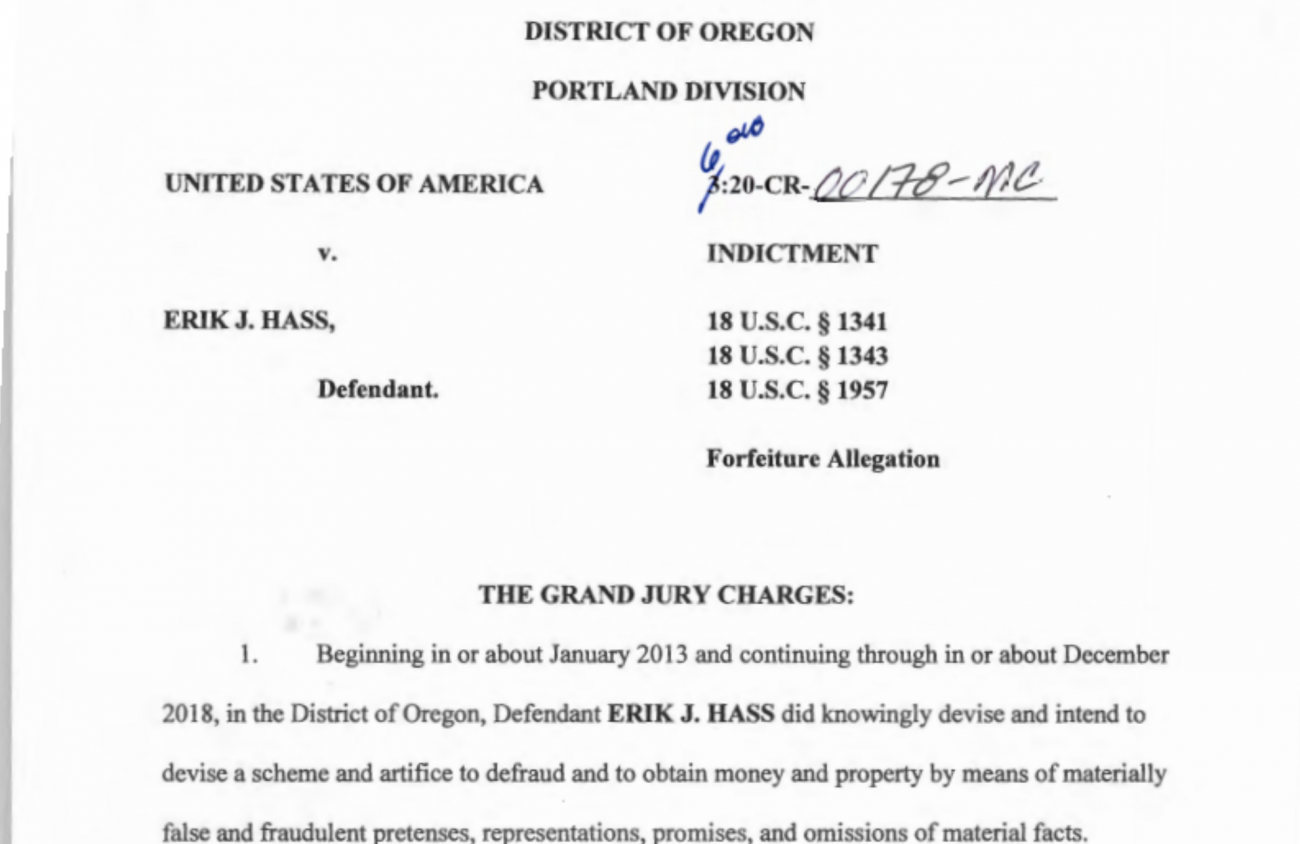A Lane County man and his Corvallis-based company ran a multimillion dollar foreign exchange trading scam that led to investors losing at least $1 million and funded the man’s personal spending. This according to court documents filed in Eugene federal court this week by a grand jury and the federal agency tasked with regulating financial derivatives.
Erik Hass and his company Simply Gains, Inc. received at least $2.1 million from 21 investors between 2013 and 2019 who sought to trade foreign exchange futures contracts, the Commodity Futures Trading Commission said in a complaint. The commission, which regulates financial products called “derivatives,” says that the investors ranged from Hass’s friends, to members of his church and co-workers at Hewlett-Packard.
A federal grand jury indicted Hass Tuesday, June 8, on five counts of wire fraud, two counts of mail fraud and one count of money laundering. The grand jury alleges that “at least 20 investors lost more than $1,000,000” through investing with Hass and his company.
The CFTC is seeking injunctive relief against Hass and Simply Gains, asking the court to issue an order requiring Hass to pay restitution to investors who lost money and also issue an order requiring Hass and the company to pay a civil fine. Despite the company’s dissolution in March 2019, the CFTC said that Hass and Simply Gains would engage in similar behavior “unless restrained and enjoined by this Court.”
Hass, who lives in Junction City, solicited investors through in-person meetings, word of mouth and through text messages, the CFTC says. The commission says that Hass made several misrepresentations about his ability to trade foreign exchange, including that he had become “highly skilled” at trading over the last five years and investors “could avoid any loss of principal and interest by giving Defendants [Hass and Simply Gains, Inc] sixty days’ notice prior to withdrawing funds.”
Hass presented himself as an accomplished trader, despite not being registered with the commission, and said he had gained more than 2 percent each month trading foreign exchange and had done so for the last three years, documents show.
Derivatives take all shapes and forms. Hass was trading foreign exchange futures contracts, a type of derivative that allows an investor to acquire a certain amount of say, euros, for a certain amount of dollars at a certain time in the future. Currency futures contracts serve as a way to hedge against risk in the fluctuating foreign exchange markets, according to the Chicago Mercantile Exchange Group.
Hass also used significant amounts of leverage and margin, or borrowed money, to invest. In some cases, Hass was leveraged 50:1, meaning he was taking on positions 50 times the size of the capital he had.
The phone number listed for Simply Gains was a disconnected number. Hass did not respond to a LinkedIn message seeking comment.
The CFTC’s filing is not the first time Hass has run into trouble with trading foreign exchange. In February 2019, Hass’s coworker and church member sued Hass and Simply Gains on behalf of himself, his mother and his wife, claiming that Hass and the company lost all the money his family invested, committed fraud and violations of Oregon’s securities laws. The man said that Hass recommended he retire and transfer the money he had in a company 401(K) into an IRA, and continue to invest with Hass. The plaintiffs say they invested a total of $1.2 million between 2013 and 2018.
Last month, a judge ruled in favor of the plaintiffs and awarded them at $2.3 million judgement.
Instead of hedging against risk, regulators say Hass did the opposite with investors’ money. Hass used the money for a Carribean cruise, to pay a “salary” of at least $10,000 a quarter for himself and his wife and to pay down credit card debt, court documents show.
When Hass did trade, regulators say he lost. Hass used $730,000 of investors’ money to trade leveraged futures contracts without any safeguards, and over the course of a few years, he lost more than $647,000, documents show.
Regulators also say that Hass’s operations were similar to that of a Ponzi scheme — using new investors’ money to pay off old investors.
Another investor who lost money was recruited by Hass to help generate leads for the company. Hass encouraged her to invest in the business and “learn how the business worked before inducing others to deposit funds” and as a result invested $50,000 of her retirement funds into Simply Gains. Hass used her money to pay back other investors, court documents show.
The individual who sued Hass in 2019 asked to withdraw $75,000 he invested to place into his retirement account, but court documents show that Hass offered excuses for a year about how this was not possible. Hass encouraged the individual to find more investors, and ended up telling the investor he lost all his money.
This story has been updated.
